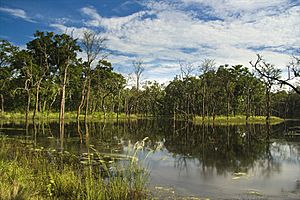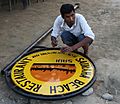Chitwan National Park facts for kids
Chitwan National Park (Nepali: चितवन राष्ट्रिय निकुञ्ज) is the first national park in Nepal. It was created in 1973, covering an area of about 932 square kilometers (360 square miles). In 1984, UNESCO named it a World Heritage Site. This means it's a very important place for everyone in the world to protect.
Many amazing animals live here, including different types of wild cats and other mammals. You can find rhinoceroses and wild elephants roaming freely. In total, about 68 different kinds of mammals and 543 types of birds call this park home. Chitwan National Park is a popular spot for tourism and for people to do research about nature in Nepal.
- Chitwan National Park
Contents
Animals You Can See
Chitwan National Park is famous for its incredible wildlife. It's one of the best places in Asia to see animals in their natural homes.
Mammals of the Park
The park is home to many large mammals.
- The one-horned rhinoceros is a major attraction. These huge animals can often be seen grazing in the grasslands.
- Wild elephants also live here. Sometimes, you can even see them bathing in the rivers.
- Other mammals include Bengal tigers, leopards, sloth bears, and different types of deer.
Bird Species
With over 500 types of birds, Chitwan is a paradise for bird watchers.
- You might spot colorful kingfishers, large herons, and many kinds of eagles.
- Migratory birds also visit the park during different seasons, making it even more exciting.
Reptiles and Amphibians
The rivers and wetlands are home to many reptiles.
- The mugger crocodile and the rare gharial (a fish-eating crocodile with a long, thin snout) live in the Rapti and Narayani rivers.
- Various types of snakes and frogs also thrive in the park's diverse habitats.
Why Chitwan National Park is Important
This park plays a very important role in protecting nature and helping people learn.
Conservation Efforts
Chitwan National Park was created to protect endangered animals and their homes.
- It helps save animals like the one-horned rhino and the Bengal tiger from disappearing.
- The park's staff work hard to prevent poaching and keep the animals safe.
Tourism and Education
Many people visit Chitwan National Park every year.
- Visitors can go on jungle safaris, elephant rides, or canoe trips to see the wildlife.
- It's a great place for students and researchers to study animals and plants.
- Tourism also helps the local communities by creating jobs.
World Heritage Site Status
Being a World Heritage Site means Chitwan is recognized globally.
- This status helps bring international support for conservation.
- It highlights the park's unique natural beauty and importance to the world.
Images for kids
See also
 In Spanish: Parque nacional de Royal Chitwan para niños
In Spanish: Parque nacional de Royal Chitwan para niños
 | John T. Biggers |
 | Thomas Blackshear |
 | Mark Bradford |
 | Beverly Buchanan |













